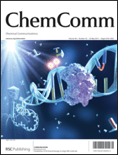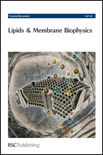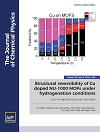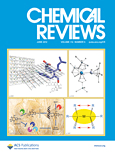
ChemistryMethods
Scope & Guideline
Advancing Practical Chemistry for a Brighter Future
Introduction
Aims and Scopes
- Innovative Analytical Techniques:
The journal emphasizes the development and application of novel analytical methods, such as advanced spectroscopy, mass spectrometry, and NMR techniques, to enhance the understanding of chemical processes. - Methodologies for Synthesis and Characterization:
A core area of focus is the exploration and refinement of synthetic methods, including flow chemistry, mechanochemistry, and automated synthesis, aimed at improving the efficiency and scalability of chemical reactions. - Integration of Computational Approaches:
Chemistry Methods publishes research that combines experimental techniques with computational modeling and machine learning, providing insights into reaction mechanisms and optimizing chemical processes. - Interdisciplinary Applications:
The journal encourages submissions that bridge multiple disciplines, such as materials science, biochemistry, and environmental chemistry, showcasing the versatility and impact of chemical methodologies. - Real-time and Operando Studies:
A distinctive contribution of the journal is the focus on in situ and operando methods that allow for the monitoring of chemical reactions and processes in real time, providing valuable insights into dynamic systems.
Trending and Emerging
- Automated and High-Throughput Experimentation:
There is an increasing focus on automation and high-throughput methodologies, enabling rapid screening and optimization of chemical reactions, which is essential for accelerating research and discovery. - Machine Learning and Data-Driven Approaches:
The integration of machine learning techniques in chemical research is trending, with applications in reaction optimization, predictive modeling, and data analysis, reflecting the increasing role of computational methods in chemistry. - Sustainable and Green Chemistry:
Research that emphasizes sustainable practices and green chemistry principles is gaining traction, focusing on environmentally friendly processes and materials, which aligns with global sustainability goals. - Advanced Spectroscopic Techniques:
There is a surge in the use of advanced spectroscopic methods, such as operando spectroscopy and multi-modal characterization techniques, which provide deeper insights into complex chemical systems. - Nanomaterials and Functional Materials:
Emerging interest in the synthesis and characterization of nanomaterials and their applications in various fields, including energy storage and catalysis, is evident, highlighting the journal's commitment to cutting-edge research.
Declining or Waning
- Traditional Synthesis Techniques:
There appears to be a waning interest in conventional synthesis methods, as the field increasingly favors more efficient and automated approaches, such as flow synthesis and mechanochemistry. - Basic Characterization Techniques:
Basic characterization methods that do not incorporate advanced technologies or interdisciplinary approaches are being published less frequently, indicating a shift towards more sophisticated analytical techniques. - Static Studies:
Research focusing solely on static measurements without real-time analysis or operando studies is declining, as there is a growing demand for dynamic and interactive methodologies that can capture changes during reactions.
Similar Journals

CHEMICAL COMMUNICATIONS
Catalyzing communication in the chemical sciences.Chemical Communications, published by the esteemed Royal Society of Chemistry, is a prominent journal within the field of chemical science, focusing on the dissemination of cutting-edge research in a variety of sub-disciplines including catalysis, materials chemistry, and electronic materials. Operating without an open access model, this journal provides critical insights from contributors around the globe, enhancing our understanding of complex chemical interactions and innovative applications. Ranked in the top quartile for several categories such as Ceramics and Composites, and Metals and Alloys, Chemical Communications boasts impressive Scopus rankings, securing strong positions across multiple fields and showcasing its influence within the scientific community. The journal is committed to advancing knowledge and fostering collaboration among researchers, professionals, and students, making it an invaluable resource for those looking to stay abreast of the latest advancements in chemistry and materials science. With a publication history dating back to 1965 and continuing into 2024, its rich archive serves as a vital repository of chemical research and development.

Revista Virtual de Quimica
Exploring Innovative Frontiers in Chemical SciencesRevista Virtual de Quimica, published by the SOC BRASILEIRA QUIMICA, is a dynamic online journal based in Brazil, dedicated to promoting innovative research in the field of chemistry and related disciplines. Established in 2011, the journal has made significant strides in contributing to the academic landscape, receiving an impact factor that highlights its relevance, although it currently holds a Q4 quartile ranking in the miscellaneous category of Chemistry and Mathematics as of 2023. The journal is committed to open access, ensuring that scholarly articles are readily available to researchers, professionals, and students worldwide. Its focus encompasses diverse areas within general chemistry, aiming to foster knowledge sharing and collaboration among the scientific community. By providing a platform for high-quality research publications, Revista Virtual de Quimica stands as an essential resource for advancing chemical sciences and encouraging interdisciplinary studies.

FARADAY DISCUSSIONS
Exploring the Frontiers of Theoretical and Physical ChemistryFARADAY DISCUSSIONS, published by the prestigious Royal Society of Chemistry, serves as a premier platform for scholarly discourse in the realms of both Physical and Theoretical Chemistry and Medicine. With its ISSN 1359-6640 and E-ISSN 1364-5498, this journal has a rich history dating back to 1947, evolving through significant periods of scientific advancement, with engaging discussions scheduled through to 2024. Recognized for its impact, FARADAY DISCUSSIONS ranks in the Q1 category for Physical and Theoretical Chemistry and Q2 for miscellaneous Medicine in 2023, affirming its role in pioneering research and innovative thought leadership. Researchers and professionals alike benefit from this journal’s commitment to open, critical dialogue on current trends and breakthroughs in chemistry, making it an essential resource for anyone looking to stay at the forefront of these dynamic fields.

Chemical Methodologies
Unlocking the Potential of Chemical MethodologiesWelcome to Chemical Methodologies, a premier journal published by SAMI PUBLISHING CO-SPC, dedicated to advancing the field of chemistry through innovative research and methodologies. With an ISSN of 2645-7776 and an E-ISSN of 2588-4344, this journal provides a vital platform for researchers and scholars to share their findings in areas encompassing physical, theoretical, and organic chemistry. Despite its initial HIndex and quartile rankings still being established, the journal's evolving impact within the academic landscape is underscored by its Scopus Ranks, which place it in the 35th percentile for physical and theoretical chemistry and the 33rd percentile for organic chemistry. Since its inception in 2022, and continuing through 2024, Chemical Methodologies aims to foster collaboration and knowledge dissemination among academics and practitioners alike, bridging theoretical concepts and practical applications. This open-access platform enhances accessibility for researchers and students worldwide, ensuring that groundbreaking contributions to chemical science reach a broad audience.

JOURNAL OF CHEMICAL PHYSICS
Unveiling the Mysteries of Chemical InteractionsJOURNAL OF CHEMICAL PHYSICS, published by AIP Publishing, stands as a premier scholarly source within the realms of physical and theoretical chemistry, as well as physics and astronomy. With an enduring history dating back to 1933 and converging until 2024, this journal has established itself as a cornerstone of the scientific community, evidenced by its prestigious Q1 categorization in multiple fields, including medicine and general physics. It is ranked 37th out of 243 in the general physics and astronomy category and holds a commendable 39th position in physical and theoretical chemistry according to Scopus rankings, highlighting its significant impact in these disciplines. Although not an open-access journal, it caters to a wide audience of researchers, professionals, and students seeking to deepen their understanding of the interactions and dynamics of chemical systems. With its expertly curated content, the JOURNAL OF CHEMICAL PHYSICS continues to play a vital role in advancing knowledge and fostering innovation across its core subjects.

CHEMICAL REVIEWS
Pioneering Reviews for the Modern Chemist.Chemical Reviews, published by the American Chemical Society, is a leading journal in the field of chemistry, renowned for its comprehensive and authoritative reviews on a wide range of chemical topics. With its ISSN 0009-2665 and E-ISSN 1520-6890, this prestigious journal has maintained a remarkable trajectory since its inception in 1924, continuously contributing to advancements in the chemical sciences. As a Q1 journal in the Chemistry (miscellaneous) category, it stands at the forefront of research, boasting an impressive Scopus rank of #1 out of 408 in the field of General Chemistry, positioning it within the top 1% of the field. Chemical Reviews offers invaluable insights and serves as a critical resource for researchers, professionals, and students alike, facilitating knowledge exchange and fostering innovation in chemistry. While currently not open access, it remains a vital component of the scientific community, gathering an extensive readership base eager for the latest developments, methodologies, and theoretical frameworks in this dynamic discipline.

Processes
Bridging gaps in science with impactful scholarship.Processes is an esteemed open-access journal published by MDPI, dedicated to advancing the understanding and application of scientific principles within the realms of bioengineering, chemical engineering, and process chemistry and technology. Founded in 2013 and based in Basel, Switzerland, this journal aims to foster rigorous research dissemination without the barriers of traditional publishing, making a diverse array of scholarly articles accessible to the global scientific community. With an impressive standing in the academic landscape, Processes is classified in 2023 within prestigious quartile rankings, including Q2 in Chemical Engineering (miscellaneous) and Q3 in both Bioengineering and Process Chemistry and Technology, reflecting its relevance and contribution to these dynamic fields. The journal welcomes submissions that not only present innovative methodologies and experimental findings but also encourage interdisciplinary collaboration and knowledge sharing among researchers, professionals, and students. As of recent metrics, it ranks favorably within Scopus, reinforcing its impact and relevance for ongoing research and development in these disciplines. Explore Processes as a source of inspiration and knowledge for your next scientific endeavor.

RUSSIAN JOURNAL OF GENERAL CHEMISTRY
Advancing the Frontiers of General ChemistryThe Russian Journal of General Chemistry is a prominent scholarly publication dedicated to advancing the field of general chemistry. Published by MAIK NAUKA/INTERPERIODICA/SPRINGER, this journal contributes significantly to the global chemistry landscape, offering a platform for researchers and professionals to share their latest findings and methodologies. With an ISSN of 1070-3632 and an E-ISSN of 1608-3350, it has established itself as a resource for high-quality research articles since its inception in 1996. Though currently indexed in the Q4 category for chemistry (miscellaneous) and ranking #299 out of 408 in general chemistry according to Scopus, the journal remains an important venue for academic contributions that bridge gaps in traditional chemical disciplines. Desiring to cater to a diverse range of interests within chemistry, the journal actively encourages submissions that reflect significant scientific achievements, innovations, and collaborative studies. Although the journal does not currently offer open access, its role in disseminating crucial chemical research cannot be overstated. Researchers and students alike will find valuable insights and rigorous scientific discourse in its pages.

Molbank
Advancing Molecular Insights for a Collaborative FutureMolbank is an open-access journal published by MDPI, dedicated to the fields of Biochemistry, Organic Chemistry, and Physical and Theoretical Chemistry. Established in 2002, this journal has served as a vital platform for the dissemination of research findings, where researchers and professionals share original articles focusing on molecular chemistry, synthesis, and related studies. With a commitment to open access, Molbank enables global access to scientific knowledge, fostering collaboration and innovation among scientists. While currently categorized in the fourth quartile for its field rankings, it provides a unique opportunity for emerging scholars to contribute to and engage with the scientific community. The journal is based in Switzerland, operating from its office at ST ALBAN-ANLAGE 66, CH-4052 BASEL, SWITZERLAND, and continues to attract submissions until 2024. Researchers, students, and professionals looking to expand their knowledge and participate in the dialogue of current molecular chemistry can benefit significantly from engaging with the content published in Molbank.

JOURNAL OF CHEMICAL SCIENCES
Empowering Chemists: Open Access to Scientific ExcellenceThe JOURNAL OF CHEMICAL SCIENCES, published by the Indian Academy of Sciences, is a premier academic journal that serves the global community of chemists and researchers. With an ISSN of 0974-3626 and an E-ISSN of 0973-7103, this journal is pivotal in disseminating high-quality research across diverse areas of chemical sciences. As of 2023, it holds a respectable Q3 ranking in the field of Chemistry (miscellaneous) and ranks #215 out of 408 in General Chemistry according to Scopus, reflecting its commitment to advancing the discipline. Operating in an open-access format, the journal ensures that research findings are readily accessible to a broader audience, fostering collaboration and innovation. Established in 1980 and continuing to evolve, the journal's scope encompasses fundamental and applied chemistry, and aims to bridge gaps between theoretical and practical applications. With a mission to support the scientific community, the JOURNAL OF CHEMICAL SCIENCES is an essential resource for researchers, professionals, and students alike, providing a platform for the exchange of groundbreaking ideas and discoveries.